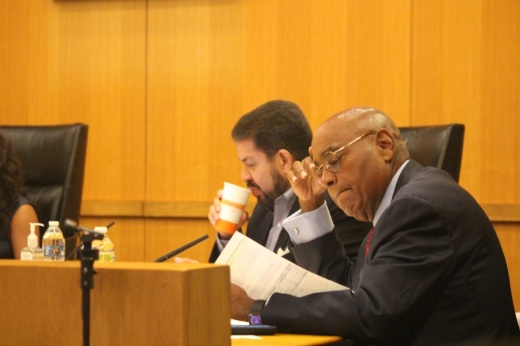At least four members of court must be present to take a vote on the tax rate; Precinct 3 Commissioner Tom Ramsey and Precinct 4 Commissioner Jack Cagle did not appear for the second consecutive meeting, denying the court an opportunity to vote.
Two meetings remain before the final deadline to adopt a tax rate on Oct. 28. The overall proposed tax rate of $0.575 per $100 of valuation will be reposted for the Oct. 11 meeting—giving commissioners another opportunity to vote—according to Budget Director Daniel Ramos. The proposed rate is slightly lower than the previously posted rate, which had been calculated based on an estimate of property tax revenue.
County Judge Lina Hidalgo said she was looking into what action the court could take to “compel” Ramsey and Cagle to attend, but the county attorney needed to do some more research to that end. She added that a previous suggestion by Ramsey to provide $20 million of funding for 200 additional patrol officers was on the table to get the other commissioners on board.
“I just want to make clear that we’re looking at every option,” Hidalgo said. “If you’re one of the people that doesn’t see the services you expect, whether it’s law enforcement, whether it’s hospitals—call your commissioner.”
After the discussion on the tax rate, Precinct 2 Commissioner Adrian Garcia requested the court hold over 50 items related to engineering and flood control projects in Precincts 3 and 4. Hidalgo said she had to speak up for her constituents in those precincts and attempted to move the items forward, but Garcia and Precinct 1 Commissioner Rodney Ellis did not second her motion.
Cagle told Community Impact Newspaper that he believes holding routine agenda items amounted to “holding the public hostage.”
“They say, ‘Come down and negotiate with us,'” Cagle said. “That’s not good faith negotiating—that’s blackmail.”
He did not say whether he would attend the next meeting and referred to the discussion before the Aug. 18 split 3-2 vote to put a $1.2 billion bond on the ballot when Ellis moved to end debate after 45 minutes.
“Five sessions back when we tried to have a discussion on the bond, I think Tom Ramsey got three of his seven questions out ... [and] I wasn’t even allowed to have a question,” Cagle said. “That’s kind of our experience on how debate goes these days.”
Harris Health System budget adopted
Several speakers warned of the consequences of adopting a hospital district budget based on a no-new-revenue rate, or the rate capping the county’s property tax-generated revenue to the same amount as the previous year.
Audrey Nath, a resident of Precinct 1 who had previously worked for Harris Health System, said virtually the district is already functioning on a “shoestring budget” and the impacts of the smaller adopted budget would affect the most vulnerable county residents.
And Dr. Esmaeil Porsa, president and CEO of Harris Health, had previously warned of a $45 million deficit for the hospital district if it was forced to adopt a smaller budget than the proposed. At the Sept. 27 meeting, he spoke virtually to add there is no “rainy day fund” to cover the $45 million operational shortfall.
“Again, I implore the commissioners to come together and find a way to support our system to the level that is needed and our people deserve,” Porsa said.
Cagle said he supports the work of Harris Health, but said he believes it is not the time to lay an extra burden on the public.
“I think Dr. Porsa was very artful in saying [Harris Health] does not have a reserve or a slush fund," Cagle said. "It might not be called a reserve fund for them. I think it’s called a working fund, ... but at the end of the day, they have funds to where they don’t have to do these drastic cuts."
According to the budget submitted to Commissioners Court, the district will consider an $11.6 million reduction in its budget through minimizing contract labor, a $24.7 million reduction through cutting strategic initiatives like a planned expansion of same day clinic/urgent care hours and an $8.5 million reduction through reducing or eliminating purchased clinical services.





